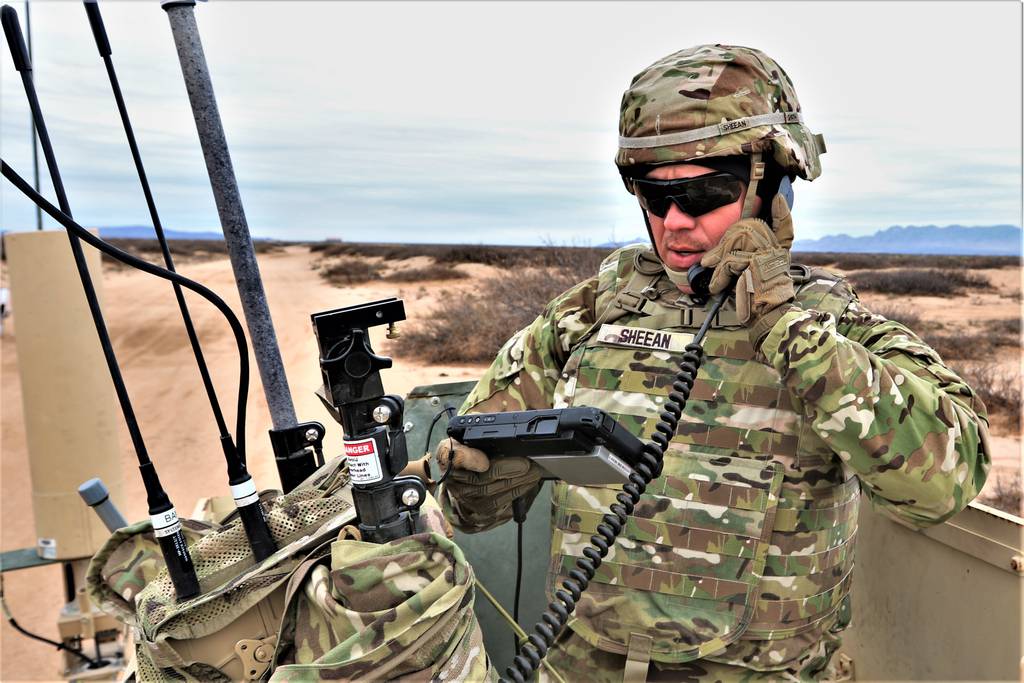WASHINGTON — For the first time, Army leaders combined two exercises to test emerging cyber technology needs in a more real-world tactical environment.
This year, Cyber Quest — an annual demonstration of emerging technology needs at Fort Gordon —was conducted in concert with the Army Expeditionary Warrior Experiment at Fort Benning. The event is designed to test new concepts and technologies for multidomain battle focused at lower echelons, such as company and below.
Army officials explained that combining the two events more closely aligns to the Army and Department of Defense’s push toward multidomain operations.
“As we move toward multidomain operations … and we look at competition below the level of armed conflict, maneuvering very often will likely send a message as much as it will execute kinetic effects,†Maj. Gen. Neil Hersey, commander of the Army Cyber Center of Excellence, told reporters March 15. “Bringing those two things closer together supports multidomain operations.â€
Moreover, the battle labs at Fort Gordon’s Cyber Center of Excellence and Fort Benning’s Maneuver Center of Excellence are pursing similar technological endeavors, creating a synergy to mature on similar paths. There was also a mutually beneficial relationship between the two, in which the Maneuver Center could harness the Cyber Center’s more robust technological knowledge, while the Cyber Center stays attuned to what maneuver commanders need to be successful in their battlespace.
The tactical radios and electronic warfare systems will be used by soldiers at the tip of the spear. Officials explained that getting them into the hands of soldiers conducting real-life missions during an exercise against an active opposing force provides a better test bed to put the technology through its paces.
In the past, Cyber Quest has been mostly a lab-based demonstration in which the Army solicits specific technology needs. Members of industry will bring forward solutions they believe can help solve these problems. Technologies that perform well are then advanced to future exercises involving soldiers and scenarios.
This year, just the cyber equipment at the brigade tactical operations center, located at Fort Gordon, was simulated.
Fourteen vendors came to Fort Gordon with 15 technologies ranging from cyber situational awareness to electronic warfare to tactical radios. A variety of units, such as 4th Infantry Division, 1st Armor Division, the Cyber Protection Brigade, the 915th Cyber Warfare Battalion, tested equipment and brigade staff sections.
Officials described a live electromagnetic spectrum environment that the soldiers at Benning operated in.
Some systems tested were for light formations to extend the range of the forthcoming Terrestrial Layer System — the Army’s first integrated electronic warfare, signals intelligence and cyber platform — tools to obfuscate electromagnetic emissions, systems to counter adversary intelligence and protect friendly forces as well as a spectrum analyzer tool designed to enable staff sections to detect adversary jamming, troubleshoot radio communications, and visualize friendly electromagnetic signatures for emissions control and force protection.
Officials said they learned a lot at the exercise, especially how units responded to threats of adversary jamming from the opposing force. For example, units altered their paths or used other experimental assets, such as drones, for better forward reconnaissance based upon what the adversary was doing in the electromagnetic spectrum. This flipped the script, providing the friendly forces an advantage.
The exercise also tested a variety of cyber technologies. One in particular was a tool designed to obfuscate cyber operations. In the event the software code used for offensive operations is intercepted or reverse engineered, the tool is designed to limit attribution or identification of its origins. This would be used by soldiers of the 915th Cyber Warfare Battalion, a relatively new unit designed to augment brigades with cyber and electronic warfare capabilities at the tactical edge.
Given the necessary linkage between the tactical on the ground forces and U.S. Cyber Command’s Cyber Mission Force, officials said this tool was designed for use by both.
Mark Pomerleau is a reporter for C4ISRNET, covering information warfare and cyberspace.








